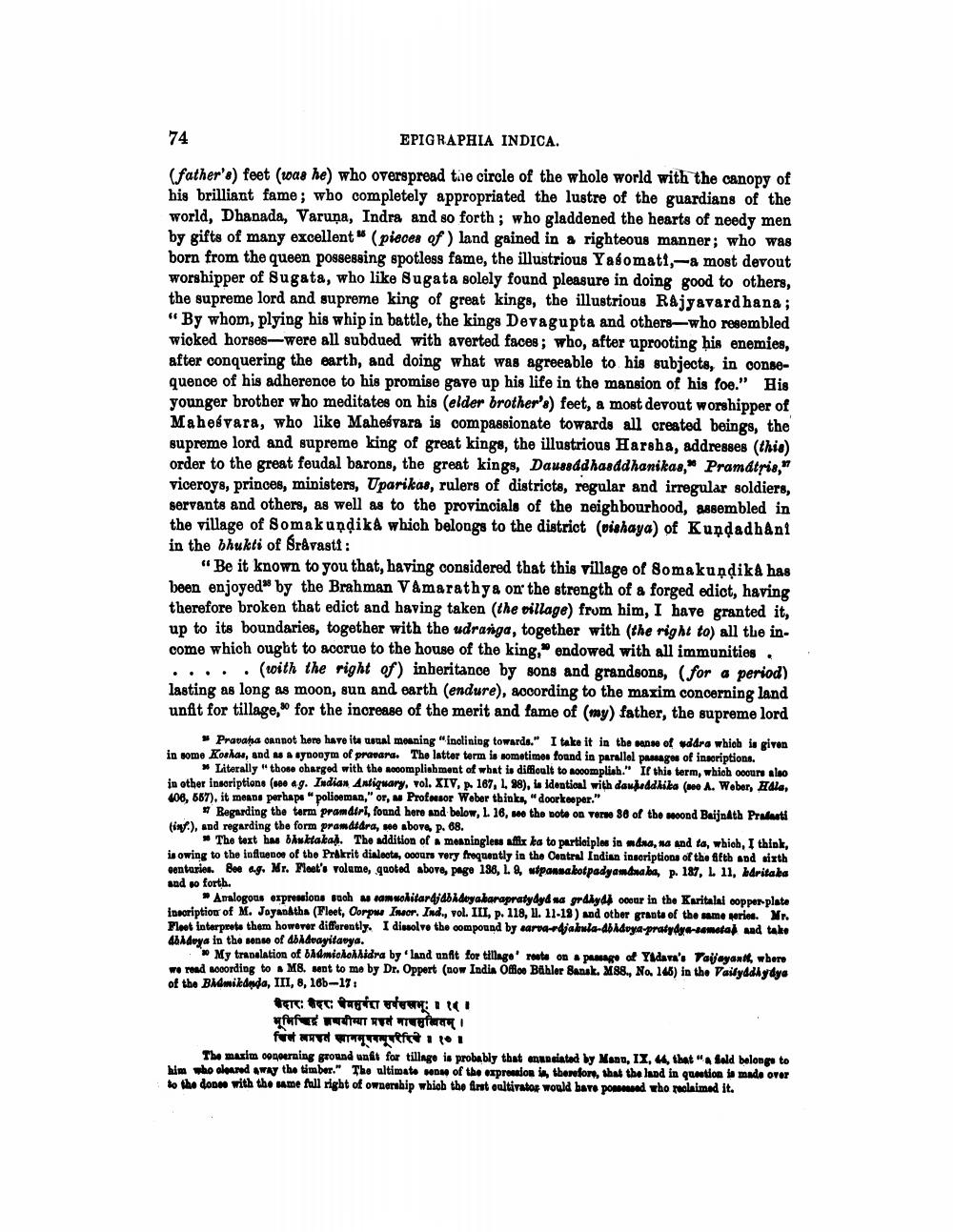________________
74
EPIGRAPHIA INDICA.
(father's) feet (was he) who overspread the circle of the whole world with the canopy of his brilliant fame; who completely appropriated the lustre of the guardians of the world, Dhanada, Varuna, Indra and so forth; who gladdened the hearts of needy men by gifts of many excellent" (pieces of) land gained in a righteous manner; who was born from the queen possessing spotless fame, the illustrious Yasomati,-a most devout worshipper of Bugats, who like Sugata solely found pleasure in doing good to others, the supreme lord and supreme king of great kings, the illustrious Rajyavardhana; "By whom, plying his whip in battle, the kings Devagupta and others who resembled wicked horses-were all subdued with averted faces; who, after uprooting his enemies, after conquering the earth, and doing what was agreeable to his subjects, in consequence of his adherence to his promise gave up his life in the mansion of his foe." His younger brother who meditates on his (elder brother's) feet, a most devout worshipper of Mahesvara, who like Maheśvara is compassionate towards all created beings, the supreme lord and supreme king of great kings, the illustrious Harsha, addresses (this) order to the great feudal barons, the great kings, Daussddhasddhanikas," Pramatris," viceroys, princes, ministers, Uparikas, rulers of districts, regular and irregular soldiers, servants and others, as well as to the provincials of the neighbourhood, assembled in the village of Somakundika which belongs to the district (vialaga) of Kundadhan! in the bhukti of Sråvasti:
"Be it known to you that, having considered that this village of Somakundika has been enjoyed by the Brahman VAmarathys on the strength of a forged edict, having therefore broken that edict and having taken (the village) from him, I have granted it, up to its boundaries, together with the udranga, together with (the right to) all the income which ought to accrue to the house of the king," endowed with all immunities.
.. (with the right of) inheritance by sons and grandsons, (for a period) lasting as long as moon, sun and earth (endure), according to the maxim concerning land unfit for tillage," for the increase of the merit and fame of (my) father, the supreme lord
Pravaha cannot here have its usual meaning "inolining towards." I take it in the sense of wddra which is given in some Koshas, and as a synonym of pravara. The latter term is sometimes found in parallel passages of inscriptions. Literally "those charged with the accomplishment of what is difficult to accomplish." If this term, which occurs also in other inscriptions (see ag. Indian Antiquary, vol. XIV, p. 167, 1, 88), is identical with daubeddhika (see A. Weber, Hala, 406, 557), it means perhaps "policeman," or, as Professor Weber thinks, "doorkeeper."
Regarding the term pramdiri, found here and below, 1. 16, see the note on verse 38 of the second Baijnath Pradasti (inf), and regarding the form pramátára, see above, p. 68.
The text has buktakak. The addition of a meaningless affix ka to participles in mana, na and ta, which, I think, is owing to the influence of the Prakrit dialects, occurs very frequently in the Central Indian inscriptions of the fifth and sixth eenturies. Bee ag. Mr. Fleet's volume, quoted above, page 136, 1. 8, utpannakotpadyamanaka, p. 187, L. 11, háritaka and so forth.
Analogous expressions such as samuchitardjabhdeyakarapratydyd na grdayda occur in the Karitalai copper-plate inscription of M. Jayan&tha (Fleet, Corpus Insor. Ind., vol. III, p. 118, 11. 11-18) and other grants of the same series. Mr. Fleet interprets them however differently. I dissolve the compound by earva-rdjakula-dbidvya-pratydya-sametaj and take 4hAdeya in the sense of dbhavayitavya.
0 My translation of bAdmichohhidra by 'land unfit for tillage' rests on a passage of Yadava's Faijayantt, where we read according to a MS. sent to me by Dr. Oppert (now India Office Bühler Sansk. MSS., No. 145) in the Failyddhydya of the Bidmikanda, III, 8, 16b-17:
SET: RE: agreferung:
भूमिच्च लययोग्या प्रहतं नावमुत्थितम् ।
feet and ukfeử 1 20 1
The maxim concerning ground unfit for tillage is probably that enunciated by Manu, IX, 44, that "a fold belongs to him who cleared away the timber." The ultimate sense of the expression is, therefore, that the land in question is made over to the donee with the same full right of ownership which the first cultivator would have possessed who reclaimed it.




